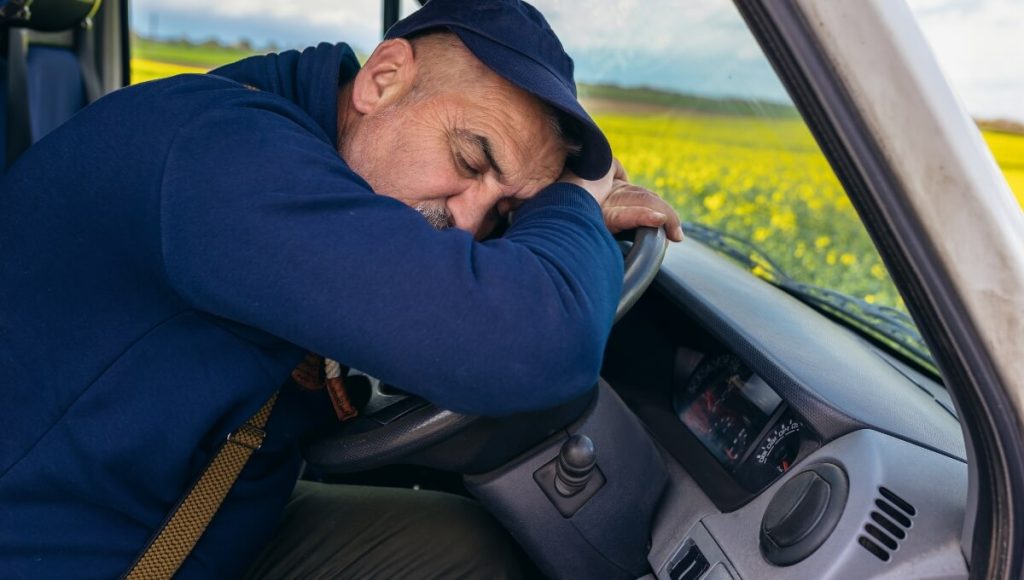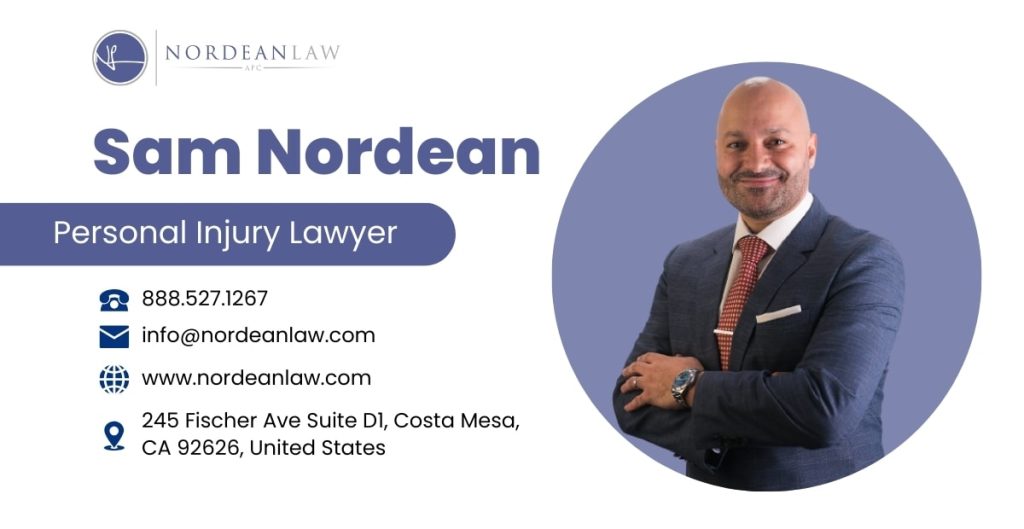Discover how sleep apnea in truck drivers impacts road safety, its causes, symptoms, treatments, and steps after an accident.

At Nordean Law, we strive to keep our community safe. We pursue justice for the injured and we share critical information on how to keep you and your family safe.
Follow the link below for the best tips to prevent accidents of all kinds. If you have a specific question, or if you were injured in an accident, reach out to one of our attorneys today.
Truckers with sleep apnea frequently suffer from drowsiness, fatigue, and impaired alertness, significantly increasing the risk of road accidents. The truck drivers who cover long distances and spend extended hours are prone to this condition.
Addressing sleep apnea among truck drivers is crucial for ensuring road safety, as sleep disorders can compromise their well-being.
Sleep apnea is a disorder that occurs due to repeated breathing pauses when you are asleep. These interruptions in breathing can last for several seconds to minutes and may occur multiple times throughout the night. The disruption results in low-quality sleep.
There are three types of sleep apnea, which includes:
Obstructive sleep apnea is the most common of the three. According to the report of the National Library of Medicine, around 26% of commercial truckers suffer from Obstructive Sleep Apnea.

Sleep apnea happens when the muscles at the back of your throat loosen up too much. These muscles help hold up the soft palate, the little triangle-shaped tissue called the uvula, the tonsils, the sides of your throat, and the tongue. When they relax too much, your airways narrow, and sometimes they even shut while you breathe. Narrow airways make it hard to get enough air, resulting in lower oxygen levels in your body. This affects your alertness, which could lead to accidents.
The following factors may increase the chance of developing sleep apnea:
Sleep apnea shows up differently for everyone. If you snore loudly, gasp for air at night, or still feel sluggish even after a good night's sleep, you might have sleep apnea. Besides, some other symptoms are:
Most sleep issues can be fixed once diagnosed, so it's best to see a doctor if you doubt about having sleep apnea. We have highlighted a few precautionary measures to help you control the condition.
Some of those measures are:
Tennis Balls: Snoring can interrupt your breathing, gradually developing the sleep apnea. When you are on your back, gravitational forces cause the tissues surrounding your airway to move downward, narrowing the airway. The tennis ball method involves sewing or attaching a tennis ball to the back of pyjamas or a sleep shirt. When a person attempts to sleep on their back, the discomfort from the tennis ball encourages them to shift to a side sleeping position, which may reduce the occurrence of breathing interruptions associated with sleeping on the back.
This technique promotes side sleeping, potentially keeping the airways more open and decreasing the likelihood of snoring or pauses in breathing common in sleep apnea.
Mandibular Advancement Device (MAD): These custom mouthguards, made by dentists, nudge your bottom jaw forward, keeping your throat open for better breathing during sleep. They work well for mild obstructive sleep apnea.
Continuous Positive Airway Pressure (CPAP): For moderate to severe sleep apnea, a CPAP machine delivers gentle air pressure through a mask over your nose and mouth while you sleep. It helps keep your airway open, controlling apnea and snoring.
Weight loss: This is a long-term solution for sleep apnea. We tend to gain weight around the neck, which can cause breathing difficulties. Losing weight can help you recover.
Truck drivers are allowed to continue their profession if they meet the Department of Transportation (DOT) compliance. They must use a continuous positive airway pressure machine for at least four hours each night while sleeping.
A Continuous Positive Airway Pressure (CPAP) machine helps individuals with sleep apnea to breathe better during sleep. This machine keeps track of specific data like sleep intervals, number of apneas, partial airflow blockage, air leaks, and snoring throughout the night, The doctor analyzes these data and sends a note to the DOT physician confirming the driver's fitness. Upon receiving the information, the DOT issues a certificate allowing the driver to operate.
Lack of quality sleep leads to poor memory, decreased attention and slower attentiveness, significantly raising the risk of road accidents. If truck drivers with sleep apnea have to cover a long distance, they can endanger their own lives and the safety of other road users.
Every accident is different and requires a unique approach depending on the severity of the injuries, the location of the crash, and countless other factors.
However, to take control of the situation, you need to take a few urgent steps:
Ensure safety
The first step after an accident is to ensure your safety. Check for any injuries that you have sustained and get immediate medical help if necessary.
It is also important to move to a safe location to avoid further risks. Staying out of the road or the highway will prevent other vehicles from colliding with your vehicles. If you cannot move from the accident site, ask for help from the people near you.
File a police report
You will need a police report to file for your insurance claim. Call 911 and let the dispatcher know you have got into an accident. If you suffer serious injury, ask the dispatcher to send an ambulance.
Collect information and document the scene
You should document any damage to your vehicle. If you sustain any visible body injury, take pictures immediately. Try to write down as much information as possible because your memory of the event can be blurry, and you will need facts to prove you are not negligent. The most important things to note are the names of eyewitnesses, the police who reported your accident, and other parties involved.
Contact your insurance company
Contacting your insurance company after a truck accident is crucial. They start the claims process, clarify coverage, and ensure compliance with policy requirements. Your insurer could guide you through gathering evidence, understanding your rights, and protecting you from potential legal issues. This communication can help you become aware of the upcoming legal process.
Get in touch with a truck accident lawyer
If you or your family member recently met a truck accident, it is important to call a lawyer. Working with a truck accident lawyer will help you obtain a fair settlement that can cover your current and future medical treatment and lost wages.
Contact us now for free consulting at Nordean Law with an experienced lawyer.

It could be tough to prove a truck driver's responsibility in a sleep apnea-related accident. Having strong evidence can speed up your compensation process. In such cases, talking to a lawyer specializing in truck accidents is crucial. If you had such an accident, here's what you should do:
Check the driver's records: If the driver was on CPAP treatment for sleep apnea, share those medical records. Look into the driver's logbook to ensure they follow the rules on driving hours. You can verify this through devices like EROAD, Keeptruckin, Transflo, and others.
Gather proof: Collect evidence like CCTV footage of the accident (if available), the police report, and any statements from witnesses. These records can strengthen your case.
Figure out your damages: Talk to medical, legal, and psychological experts to understand the impact of your injury. The damages are not just not related to your physical health but also cover lost income and other damages like disabilities or emotional suffering. You must keep records of all the receipts, bills, and expenses related to your treatment. It helps support your claim for medical compensation.
Nordean Law, a California-based firm with over 13 years of expertise, specializes in personal injury cases, particularly those involving truck accidents. Our seasoned lawyers navigate complex trucking regulations, conduct thorough investigations, and understand the long-term impact of truck accidents. With experience negotiating with large trucking companies and insurers, we ensure fair settlements and, if necessary, excel in trial scenarios specific to trucking accidents. We are committed to maximizing compensation; our skilled team accurately assesses damages, including medical costs, lost wages, and non-economic damages.
Let us fight for the compensation you deserve. Contact Nordean Law for Free Consulting.
Can you be a truck driver with sleep apnea?
Yes, you can be a truck driver even if you have sleep apnea. However, you will need proper treatment and approval from the medical examiner to continue the profession.
What percentage of truck drivers have sleep apnea?
Sleep Apnea is more common than you think. According to the American Trucking Association’s report, 28% of commercial truckers have mild to severe sleep apnea.
Are most people with sleep apnea fat?
Sleep apnea can be caused due to many health conditions, but being obese or overweight can be one of the major reasons. According to the Sleep Foundation, excess weight creates fat deposits in a person’s neck, called pharyngeal fat, and it could block a person’s upper airway during sleep when the airway is already relaxed.
What diseases is sleep apnea associated with?
According to Johns Hopkins Medicine, sleep apnea can be associated with other diseases like type 2 diabetes, heart attack, stroke and shortened lifespan.
Sleep apnea can be caused due to many health conditions, but being obese or overweight can be one of the major reasons. According to the Sleep Foundation, excess weight creates fat deposits in a person’s neck, called pharyngeal fat, and it could block a person’s upper airway during sleep when the airway is already relaxed.
According to Johns Hopkins Medicine, sleep apnea can be associated with other diseases like type 2 diabetes, heart attack, stroke and shortened lifespan.
Sleep Apnea is more common than you think. According to the American Trucking Association’s report, 28% of commercial truckers have mild to severe sleep apnea.
Yes, you can be a truck driver even if you have sleep apnea. However, you will need proper treatment and approval from the medical examiner to continue the profession.